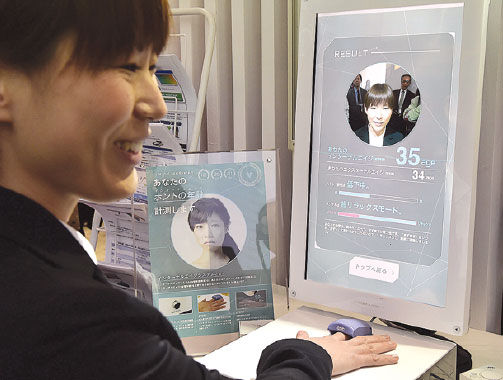Gadgets around us will keep getting smarter
(Agencies) Updated: 2016-01-23 06:58
 |
|
An employee of electronics giant Sharp demonstrates a prototype device to display a user's physical age with a pulse wave sensor to evaluate blood vessel age. Users can compare their physical age and real age with the device. [Photo/Agencies] |
As for the risks, they'll tend to be diffuse, abstract and often difficult to ascertain even if you're paying attention - and most people won't. In a study released recently, the Pew Research Center says about half of American adults have no confidence that they understand what's being done with their data, and about a third are discouraged by the amount of effort needed to get that understanding.
In short, convenience usually wins. Shiny new things are inherently attractive, and it takes a while for some of us to get uneasy about the extent to which we may be enabling our own surveillance.
Humans have made this bargain with technology for some time. When cameras were invented, legal scholars debated how far you can go snapping pictures of people in public. That's no longer an issue - although the camera on a drone in your backyard is.
Over time, manufacturers will get better at putting in safeguards, and consumers will get better at setting boundaries and taking charge.
For instance, this holiday season's Hello Barbie talking toy won't listen in until your kid presses its belt buckle. Though it does store conversations between kids and their dolls to improve speech-recognition technology, its maker says there's little personal information tied to those conversations - no first or last names, no ages, no gender.
"We don't need that information," says Martin Reddy, co-founder and chief technical officer of ToyTalk, which developed Hello Barbie with Mattel. "We don't want that information. It just makes it more difficult on our end."
Of course, kids might simply tell their toys personal details about themselves. ToyTalk employees who review such conversations to improve the technology are trained to immediately delete anything sensitive, but they aren't charged with actively monitoring stored discussions.
Step One in managing interactions with our newly smart digital companions comes down to simple attentiveness. Parents, for instance, can be actively involved in what their kids are doing-in this case, by taking the time to review and delete conversations from ToyTalk's website.
Step Two might be learning to say no. Many services ask for birth dates, phone numbers and even income levels just because they can - and few people resist. If enough people rise up, companies will stop. There's precedent: Enough people fed up with online ads have turned to ad blockers, such that websites are taking steps to make ads less annoying.
There will always be a trade-off, but the balance can always shift.
- Smart wearable devices on track to serve fitness fanatics
- Top 11 events in the wearable sector in 2015
- Wearable gadgets shine at 2016 International CES
- Chinese technology, Italian design give birth to first smart jewelry brand
- Right time for wearable devices
- China sees spiking software, IT product sales
- BMW opens first engine plant in China
- China's maritime output expected to near 6.5 trillion yuan
- China sees steady growth of property loans
- Record dreams with dream recorder
- Gadgets around us will keep getting smarter
- Yingli in debt revamp talks with potential investors
- Local govts ask appliance makers to return subsidies
- Shandong Ruyi bids for French fashion group
















